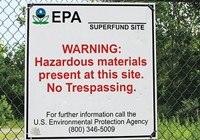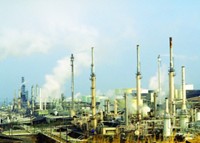Advertisement
Grab your lab coat. Let's get started
Welcome!
Welcome!
Create an account below to get 6 C&EN articles per month, receive newsletters and more - all free.
It seems this is your first time logging in online. Please enter the following information to continue.
As an ACS member you automatically get access to this site. All we need is few more details to create your reading experience.
Not you? Sign in with a different account.
Not you? Sign in with a different account.
ERROR 1
ERROR 1
ERROR 2
ERROR 2
ERROR 2
ERROR 2
ERROR 2
Password and Confirm password must match.
If you have an ACS member number, please enter it here so we can link this account to your membership. (optional)
ERROR 2
ACS values your privacy. By submitting your information, you are gaining access to C&EN and subscribing to our weekly newsletter. We use the information you provide to make your reading experience better, and we will never sell your data to third party members.
Environment
Waste Site Cleanup Tax Opposed
Legislation proposes renewing the superfund tax, but industry decries it as unnecessary and unfair
by David J. Hanson
April 19, 2010
| A version of this story appeared in
Volume 88, Issue 16

Recent activity in Congress is pointing to the possible reestablishment of taxes on feedstock chemicals, crude oil, and corporate income to pay for hazardous waste cleanups under the Superfund law. Two bills introduced in the Senate last month to impose these taxes join a pair in the House of Representatives that have been pending since early last year. The original so-called Superfund tax with its three components expired in 1995.
The Obama Administration supports the congressional efforts to reinstate the Superfund tax. The fiscal 2011 budget submitted by the Administration in February included a plan to substitute the approximately $1.3 billion spent annually on Superfund cleanups that currently comes from general tax revenues with money collected from reimposed corporate taxes.
“Cleaning up our nation’s most toxic properties keeps our children safe, revitalizes local economies, and creates thousands of jobs. It’s time to shift the financial burden away from taxpayers and back to the industries that contaminate these properties,” proclaimed Sen. Frank R. Lautenberg (D-N.J.) when he introduced his Superfund tax legislation (S. 3164) on March 25. As do the other bills reinstating this tax, Lautenberg’s measure takes the view that the polluter pays for getting hazardous waste sites cleaned up.
The Lautenberg bill and two House measures, H.R. 564 and H.R. 832, introduced by Rep. Earl Blumenauer (D-Ore.) and by Rep. Frank Pallone Jr. (D-N.J.), respectively, would simply put back in place the excise taxes that had been imposed in the original 1980 Comprehensive Environmental Response, Compensation & Liability Act, or Superfund law. That law taxed 42 common industrial chemicals and every barrel of crude oil produced or imported. The chemicals tax varied from a low of 22 cents per ton on potassium hydroxide to a high of $4.87 per ton on a variety of organic compounds, including acetylene, benzene, 1,4-butadiene, and toluene. The tax on petroleum was set at 9.7 cents per barrel. A third component is a sort of income surtax—the corporate environmental income tax—on companies. This tax is small, but it applies to all corporations and generated about one-third of the Superfund tax receipts.
The other bill in the Senate (S. 3125), introduced by Sen. Bill Nelson (D-Fla.), is similar to the others, but it would set the taxes at a higher level, supposedly adjusted for inflation since 1995. Under Nelson’s scheme, the upper chemical rate would become $12.81 per ton and crude oil would be taxed at 17 cents per barrel.
For its part, the Environmental Protection Agency, which oversees the Superfund cleanup program, says it expects little change even if the tax is restored. EPA receives its funding for the Superfund program by congressional appropriations, and the amount Congress has approved has varied little over the years whether the money has been from the general revenues or from the Superfund tax. As a result, the level and rate of cleanups would be expected to remain static, a spokeswoman says.
The chemical industry is not so indifferent. The American Chemistry Council, the trade association that represents the largest U.S. chemical manufacturers, flatly states that the Superfund tax should not be reinstated. Stephen G. Elkins, tax policy director for ACC, tells C&EN that the Superfund tax is very difficult for the chemical industry because it applies whether a company can afford it or not. “It’s not an income tax, it’s an excise tax on certain chemical feedstocks, and it can weaken the financial position of any business subject to the tax,” Elkins says.
The industry is concerned that reestablishing this excise tax could be a big problem for U.S. manufacturers. If the Superfund tax were reimposed, especially under the terms of the Nelson bill, Elkins says it’s possible that more chemical manufacturing would move offshore to foreign companies that do not have to pay such a tax. “The end products could then be imported into the U.S. at prices that are lower than similar U.S. manufacturers’ products, whether they are plastics, contact lenses, paints, or anything else,” Elkins says. “We think this is a very real concern.”
Charles T. Drevna, president of the National Petrochemical & Refiners Association, also sees serious problems with a new Superfund tax. “Reinstating the Superfund tax would threaten U.S. jobs and energy security and would make many products U.S. consumers depend on more expensive,” he says. He also points out that the petrochemical industry was responsible for less than 10% of Superfund cleanup expenses but had to pay roughly 60% of the Superfund tax.
This disparity is another reason that impacted industries are opposed to reinstating the Superfund tax: Many of the orphaned sites that still need cleanup are not chemical company sites. Gold and other old mining operations have left behind serious environmental problems, and these industries do not pay the feedstock taxes. Other major Superfund sites that have not yet been cleaned up were created by federal agencies or are municipal landfills that corporations don’t think they should have to pay for.
The tax was meant to set up a trust account, the eponymous Superfund, to be used to clean up large abandoned hazardous waste dumps for which no responsible party could be found to otherwise foot the bill. Most of the Superfund sites have been cleaned up by the companies responsible for contaminating the site in the first place, and that is still the situation today. Under the original tax scheme, however, the trust fund grew over the years as billions of dollars accumulated in the fund and were not used.
“This was because the number of orphan sites was much smaller than Congress had anticipated, and there was less need for Superfund tax receipts than had been originally imagined,” Elkins explains. Therefore, even though the tax was dropped at the end of 1995 as specified in the original act, the Superfund itself did not run out of money until 2003.
Attempts to reinstate the tax during the George W. Bush Administration were unsuccessful as a combination of Republican Congresses and lobbying by the impacted industries kept the issue on the sidelines. But the political changes over the past few years have made the possibility of passing the Superfund tax now more likely. The current Congress, controlled by Democrats, is more amenable to environmental causes and is also looking for ways to decrease the government’s debt.
“We are in a political climate where the federal government and Congress are looking broadly for new sources of revenue, and we are quite concerned that they might consider the Superfund tax,” Elkins says. “We have a situation where this is more likely now” than it has been in the past several years.
Despite this situation, none of the bills to reinstate the Superfund tax is moving through the legislative process. No committee has held hearings on the House bills up to this point, and the Senate bills are too new for any hearings yet. If the measure gains enough support, however, the Superfund tax proposals could be attached as an amendment, or rider, to another bill and passed that way. If the Administration is to meet its goal of having the Superfund tax up and running by fiscal 2011, the tax will need to be passed before the end of this congressional session this fall.





Join the conversation
Contact the reporter
Submit a Letter to the Editor for publication
Engage with us on Twitter